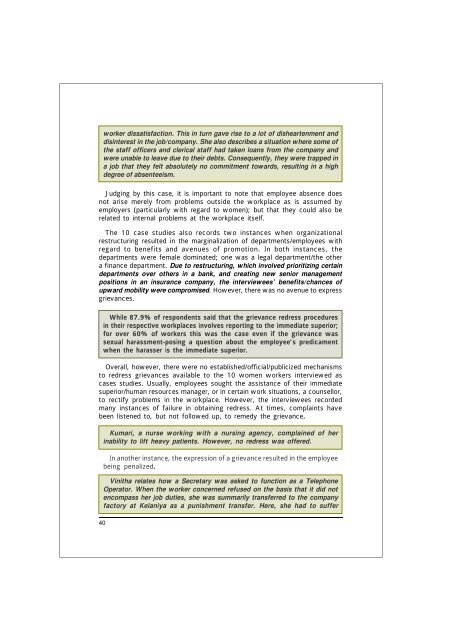Beyond Glass Ceilings and Brick Walls - International Labour ...
Beyond Glass Ceilings and Brick Walls - International Labour ...
Beyond Glass Ceilings and Brick Walls - International Labour ...
Create successful ePaper yourself
Turn your PDF publications into a flip-book with our unique Google optimized e-Paper software.
worker dissatisfaction. This in turn gave rise to a lot of disheartenment <strong>and</strong><br />
disinterest in the job/company. She also describes a situation where some of<br />
the staff officers <strong>and</strong> clerical staff had taken loans from the company <strong>and</strong><br />
were unable to leave due to their debts. Consequently, they were trapped in<br />
a job that they felt absolutely no commitment towards, resulting in a high<br />
degree of absenteeism.<br />
Judging by this case, it is important to note that employee absence does<br />
not arise merely from problems outside the workplace as is assumed by<br />
employers (particularly with regard to women); but that they could also be<br />
related to internal problems at the workplace itself.<br />
The 10 case studies also records two instances when organizational<br />
restructuring resulted in the marginalization of departments/employees with<br />
regard to benefits <strong>and</strong> avenues of promotion. In both instances, the<br />
departments were female dominated; one was a legal department/the other<br />
a finance department. Due to restructuring, which involved prioritizing certain<br />
departments over others in a bank, <strong>and</strong> creating new senior management<br />
positions in an insurance company, the interviewees’ benefits/chances of<br />
upward mobility were compromised. However, there was no avenue to express<br />
grievances.<br />
While 87.9% of respondents said that the grievance redress procedures<br />
in their respective workplaces involves reporting to the immediate superior;<br />
for over 60% of workers this was the case even if the grievance was<br />
sexual harassment-posing a question about the employee’s predicament<br />
when the harasser is the immediate superior.<br />
Overall, however, there were no established/official/publicized mechanisms<br />
to redress grievances available to the 10 women workers interviewed as<br />
cases studies. Usually, employees sought the assistance of their immediate<br />
superior/human resources manager, or in certain work situations, a counsellor,<br />
to rectify problems in the workplace. However, the interviewees recorded<br />
many instances of failure in obtaining redress. At times, complaints have<br />
been listened to, but not followed up, to remedy the grievance.<br />
Kumari, a nurse working with a nursing agency, complained of her<br />
inability to lift heavy patients. However, no redress was offered.<br />
In another instance, the expression of a grievance resulted in the employee<br />
being penalized.<br />
Vinitha relates how a Secretary was asked to function as a Telephone<br />
Operator. When the worker concerned refused on the basis that it did not<br />
encompass her job duties, she was summarily transferred to the company<br />
factory at Kelaniya as a punishment transfer. Here, she had to suffer<br />
40
















